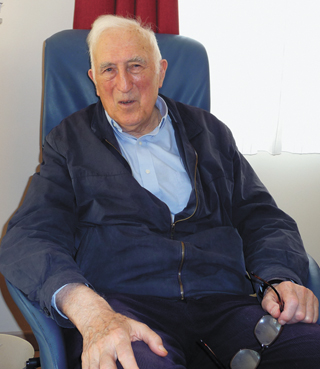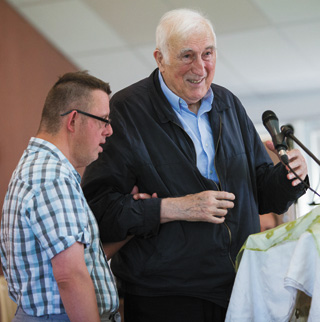Editor’s note: This is the first in a series of excerpts from an interview with Pacem in Terris Award recipient Jean Vanier at his home in Trosly-Breuil, France, on July 7. Vanier is the “beginner” of L’Arche, an international federation of communities where people with and without intellectual disabilities share life together. Vanier spoke with Catholic Messenger Editor Barb Arland-Fye just before receiving the Pacem in Terris Award from Bishop Martin Amos.

Catholic Messenger: You call yourself the beginner of L’Arche, rather than the founder. Can you explain what you mean by that?
Vanier: A beginner is just someone who begins. I took two people from a violent institution and we started living together. I had no idea that it would grow and that there would be a sort of vision, an international vision. I began it with a sense of justice and truth. You can’t leave people oppressed like that… All I could do was welcome two people and give them a more human and Christian life and lead them to happiness. The whole thing has developed into a movement, into a vision, into something that has grown internationally which I didn’t expect. I think founders have an idea of what they’re going to do. I had no idea except maybe the only thing that gave me strength was to live in the present moment and do what seems right according to the needs, and of course it was a period in France (in the 1960s) when there were very little things for people with disabilities … Social workers came to see me. They discovered what I was doing was a little bit revolutionary. It wasn’t just doing good things for people with disabilities … I gradually discovered it was a vision that people with disabilities have something to tell society.
Catholic Messenger: Tell us about the priest who inspired you to take a leap of faith in beginning L’Arche.
Vanier: … When I left the Navy, when I resigned, I headed to France and lived in a community which was mainly (made up of) people like myself who were searching, searching for Jesus, searching for prayer, searching for theology … we were about 80 people probably under 30 or 40 doing doctorates or something …. I was deeply moved by the founder of the community, Father Thomas Philippe. I felt deeply attracted to him and he became my spiritual father. At one moment he had to leave the community that he founded and I then found him again a number of years later and he was the chaplain of a small institution. I was then teaching philosophy at the University of Toronto. He suggested I come visit him and the people who were there. So that’s how it was. Somewhere I felt deeply attracted to him and to create a community not far from him.
At that time, which was 1964, it was a very auspicious time to start a community … People were yearning for homes and workshops for people with disabilities. It was a period in Canada and in the United States — starting up with (academic) Wolf Wolfensberger in Nebraska — of emptying of institutions … So I slipped into that.
Catholic Messenger: What was your greatest challenge in beginning L’Arche?
Vanier: I can’t say there was a biggest challenge. There were 100,000 things that were difficult — very little money, the house was not at all adapted … there wasn’t even a toilet. Maybe the biggest challenge was (that) I welcomed two people — but when (the) director of the institution brought them to me she brought a third one who was called Dany. And Dany couldn’t speak or hear. He was in a situation where he was in extreme anguish, running about all over the place. The last thing he needed was to leave the security of (the) institution however violent it was … and come to a place that was in the middle of a village that was open and where there was no real structure. It was crazy. He kept me up all night. I had to ring up (the director) and say come back immediately and take him … it was a crisis. There is a difference between crises and challenges. Crises, you go through them.

Catholic Messenger: Did you choose the term “core members” to describe individuals with intellectual disabilities who live in L’Arche communities?
Vanier: No. That came mainly from the United States and Canada. I think it was the Canadians who began with core members, at the core. Because there’s no way of translating core members. If you want to make a translation it would be “those who would be at the center.” We would tend to say now it’s not people with disabilities who are at the center. The center is relationship because you can have an institution where people with disabilities are at the center, but maybe it’s not a good thing. What is important at L’Arche is the quality of relationship. And relationship is a mutual humility; not there to do for, but to be with and being with to help the other to rise up and discover the beauty that’s within them.
Catholic Messenger: Isn’t that hard? Some people with disabilities need help doing things.
Vanier: It’s obvious you do things for (a person who needs help). But that is not the most important thing. The most important is revealing to them that they can do it themselves. Even those who can do very little because they have severe disabilities what you’re revealing to them is that they have beauty and that they’re important and that they have value and that it’s good to live together. Because that’s what it’s all about — is living together.
Catholic Messenger: That’s what I’ve witnessed at L’Arche.
Vanier: Relationship is communion and communion becomes celebration. Because what people need most is not that they’re doing good things, that they’re independent … that isn’t what brings the most joy. So togetherness doesn’t necessarily mean living together all the time. It’s a quality of friendship. Then I know I am loved. Then I know I am someone. That is the secret. To know that I am someone, not because I can do things, not because I can live alone, but because someone loves me … revealing to me that I am important. The quality of listening … of presence (is important).
Ceremony Aug. 25
Because Pacem in Terris Award recipient Jean Vanier no longer travels overseas, a ceremony will be held Aug. 25 at 2 p.m. in the Rogalski Center at St. Ambrose University in Davenport to honor him and L’Arche, the organization he began nearly a half-century ago in France. Bishop Martin Amos, who presented the award to Vanier in France, will participate in the Davenport event. A video of the award presentation in France will be shown, and core members and assistants from L’Arche Clinton will participate in the celebration. All of our readers are invited to attend.









my son has a developmental disability in the autism spectrum. Do you have connections in the US. I live in the state of Massachusetts.